Progressives saw Kamala Harris as a unique champion. Lately, they're disappointed.
This story has been updated with the latest USA TODAY/Suffolk poll data.
WASHINGTON – When Fernando García met with Vice President Kamala Harris in June to discuss the humanitarian crisis at the southern border, he left hopeful she could deliver major immigration policy reforms.
Months later, his optimism has evaporated.
"I think we're in a moment where there's great despair, anguish and disappointment by a number of things that have happened lately," García, executive director of the Border Network for Human Rights, told USA TODAY.
García's concerns, raised after a summer of distress on the border, are shared by advocates for a number of high-profile issues facing the White House and within Harris' purview, including immigration, voting rights and access to abortion.
Harris, the daughter of Jamaican and Indian immigrants, broke barriers when she became the first Black woman and first Asian American vice president of the United States. Many activists call on her to use her background to advocate for those with similar experiences.

Harris' approval tanks: Gloomy landscape for Democrats for midterms as Biden's approval drops to 38% in USA TODAY/Suffolk poll
Much of the exasperation is trained squarely at President Joe Biden's leadership. But some frustration spills over to Harris, who was seen by social justice advocates as a champion on their behalf.
"I do believe that if anything is going to change, if there is some force within the administration to really push for change into a more humane approach to immigration, a reform to actually mirror American values, one that also values immigrants, it will come from the vice president," García said. "But we are still waiting."
USA TODAY spoke with nearly two dozen advocates, lawmakers and political strategists about the administration's approach to hot button topics in the vice president's portfolio. Emphasizing that they still believe the administration can get results, several advocates expressed dissatisfaction with the pace of change.
Harris' political challenges are underscored in a USA TODAY/Suffolk poll that shows 28% of Americans approve of the job she's doing compared with 51% who disapprove. Her approval rating is 10 percentage points lower than Biden's, which stands at 38% in the poll taken Nov. 3-5.
Harris, who has crafted a role as an intermediary between the White House and liberal activists, was a frequent target of criticism in their conversations with USA TODAY.
The frustration crystallizes the stakes for Harris, who must fulfill the traditional role of the vice president while facing expectations by advocates to usher in an era of progressive politics that she's long championed.
The balancing act has deep implications for her political future and the Democratic Party.
The White House declined to comment for this story.
High hopes meet reality
Adriana Cadena, the statewide coordinator for the Reform Immigration for Texas Alliance, said she counted on Harris to lead the charge on a more humane immigration policy.
"There was a lot of hope when she was elected that, being a daughter of immigrants, a person of color, that the approach on how immigration was going to be addressed was going to be different," Cadena said.
“If she's the promise of a new way of doing things and she represents America as what it's going to look like in the future, then we really would like to see that in her leadership," Cadena said.
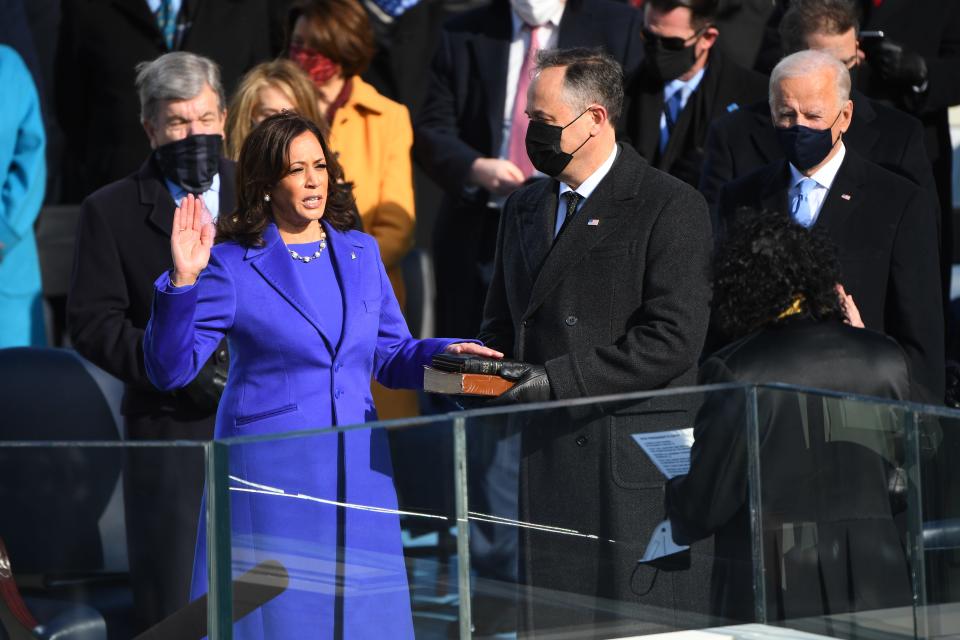
Advocates credited the administration for being willing to listen, but some of them said they believe officials are hesitant to respond boldly, fearing a backlash.
"We have not seen action behind their words," said Alma Couverthie, the national organizing director for the League of Women Voters, directing her remarks at the White House.
"These are attacks (on) the right to vote we have not seen since the times of Jim Crow," Couverthie said. Biden administration officials "need to press this if they really are committed to making this happen."
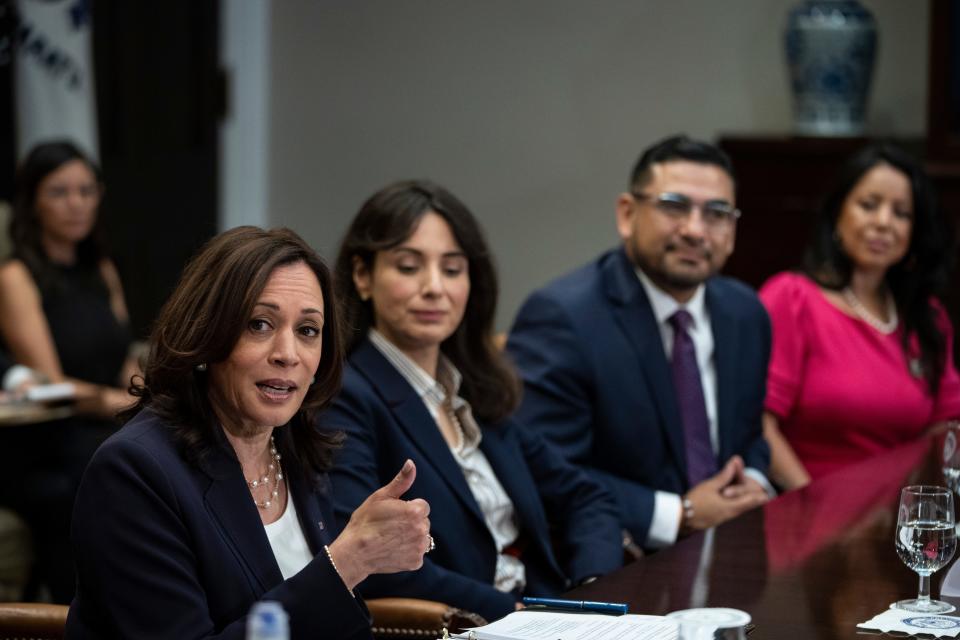
As Democrats reconsider their priorities after an upset loss in the Virginia gubernatorial race, advocates maintain their causes will be advanced through a strategy like the one that brought Harris to the vice presidency, one more clearly progressive in substance and messaging.
"I definitely respect the political situation that folks may feel," said Jana Morgan, executive director of Declaration for American Democracy, a voting rights organization. "But the American people are asking for our elected leaders to do what we put them in power to do."
Harris' obligations and constraints
As second-in-command, Harris serves as the president's most senior adviser and a top surrogate for high-level diplomacy and talks on Capitol Hill. In the 100-member Senate divided equally between Democrats and Republicans, Harris can cast tiebreaking votes.
Biden modeled Harris’ power and portfolio after his own tenure as vice president during Barack Obama’s two terms in the White House.
Biden had an expansive role as Obama's No. 2, including leading the rollout of the nearly $1 trillion economic recovery package that helped lift the country out the Great Recession in 2009. Biden guided the U.S. handover to Iraq's civilian government in 2010, regularly traveling to the country.
Harris is charged with a similarly consequential set of duties.
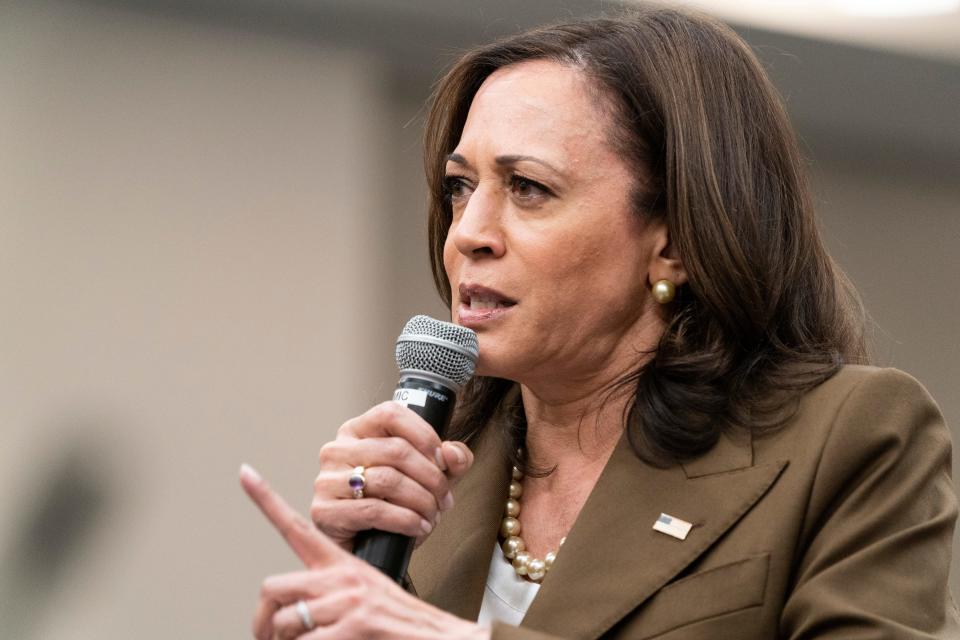
In March, Biden tasked her to address migration, a long-term challenge that took her to Guatemala this summer. In June, he asked her to lead the administration's efforts surrounding voting rights after a spate of restrictive laws were passed in several Republican-led states.
Harris has been the administration's top liaison with abortion rights advocates since the Texas Legislature passed S.B. 8, a law banning abortion after six weeks of pregnancy.
Similar missions have been given to vice presidents over the past 50 years, said Joel Goldstein, a professor of political science at St. Louis University who studies the vice presidency. He said they are often assigned tasks that require cooperation with outside groups and across a jumble of federal agencies.
"I think that people will perceive her to have been a very accomplished VP," said Celinda Lake, a veteran Democratic strategist, "just as they perceived Joe Biden to be an accomplished VP, and that was definitely a positive for being president. That was unique experience."
Some Harris allies fear that in putting some of the most intractable issues on her plate, the administration isn't setting her up for success.
“Her portfolio is trash," Bakari Sellers, who worked on Harris' unsuccessful presidential campaign, lamented during a roundtable in October at Politics and Prose, a Washington bookstore.
"You did not give her something where she could be successful. You did not give her something to best use her talent to improve the plight of many people in this country, especially people of color," Sellers said.
The potential downsides of her portfolio don't seem to have slowed the vice president.
"They want to be at the table with us, they're receptive to our feedback, they're moving things where they can move things and, I think, they're also open to having longer-term conversations," said Destiny Lopez, co-director of All* Above All, a coalition of reproductive justice groups. The strategy, Lopez said, reflects an acknowledgment that "there are no short-term fixes on this issue."
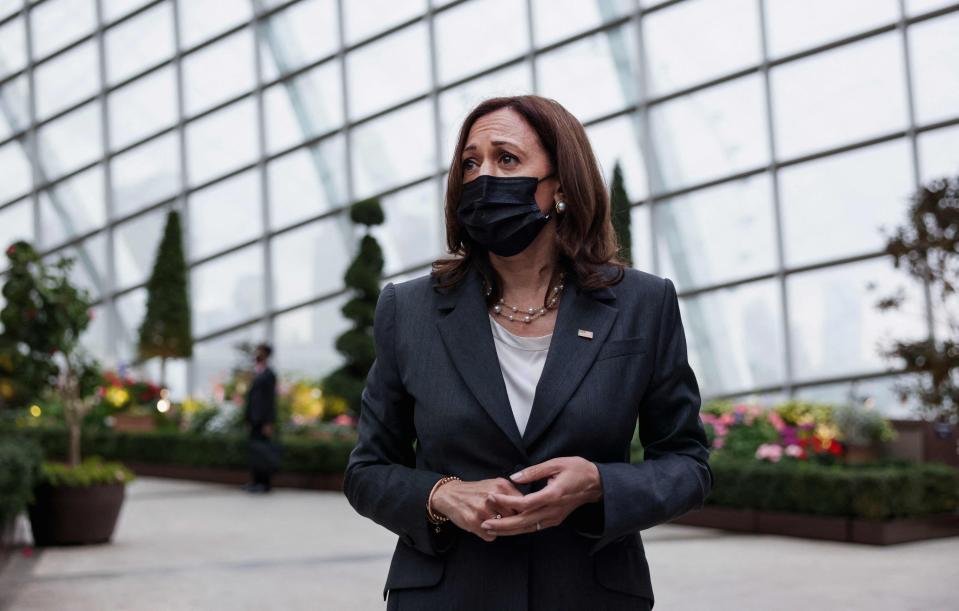
'An emergency moment': Abortion rights advocates want bigger response from Biden to Texas law
Others said they believe that Harris' expertise and commitment on these issues make her an ideal voice inside the halls of power to champion them.
When Democratic lawmakers fled Texas to stall a GOP-led election rule overhaul, "she was very curious and wanted to know how that came together because she thought that that was so symbolic for the country and how meaningful that would be to see that replicate itself across the nation when it came to voting rights," said Texas state Rep. Trey Martinez Fischer.
Martinez Fischer underscored that progress on many of the issues Harris pushes will require action from Congress, where Democrats' attention is largely devoted to Biden's infrastructure and social spending packages.
Though Harris has plenty of clout within her own party, her influence goes only so far in a closely divided Congress where Democrats face staunch resistance from Republicans to their agenda. Democrats also grapple with internal divisions over policy and tactical issues.
The vice president's role is mainly about "raising the issue and getting people, getting Democratic voters, revved up about the issue and registered and then voting, and then getting people upset about what's being done," Goldstein said.
Morgan said that Harris, as a Black and Asian American woman, "understands very well the plight that especially people of color face with voter suppression in this country." But it can't be up to only one official or one agency to shoulder the responsibility of voting rights, she said.
"This is an all-hands-on-deck moment," she said, adding that Biden and Senate Democrats bear blame for a lack of progress on voting rights.
Related: Republicans block John Lewis Voting Rights Act in Senate vote
Harris faces big expectations on high-profile issues
A history-making vice president whose election was heralded as a new chapter in American politics, Harris has long fashioned herself as a progressive crusader on a range of issues.
"I feel like she is our hope," said Angelica Salas, executive director of the Coalition for Humane Immigrant Rights of Los Angeles.
On the Senate Judiciary Committee, Harris asked tough questions of President Donald Trump's nominees.
"In the Senate, many times, she was the reason that Trump didn't get away with causing more harm," Salas told USA TODAY.
As California's junior senator, Harris championed causes such as voting rights, abortion access and immigration.
For some, anticipation of results has curdled into frustration as talks between advocates and the administration lag, while political crises and other priorities divert the White House's attention.
Lake said it's unrealistic to expect any vice president to stake out a brand or agenda that diverges from that of the president.
Vice presidents "are always focused on the president's agenda. And their images merge ... even before they get to the office," Lake said.
Harris' progressive reputation was the product of her role as a senator representing a liberal state, different from that of a tiebreaking vice president.
As a senator, "she was part of a deliberative body" and "perceived as part of a team," said Amanda Hunter, executive director of the Barbara Lee Family Foundation, a nonpartisan research group.
"Now she is in a much different position and held to a higher standard because she is expected to be executing things on a much higher and different level," Hunter said.
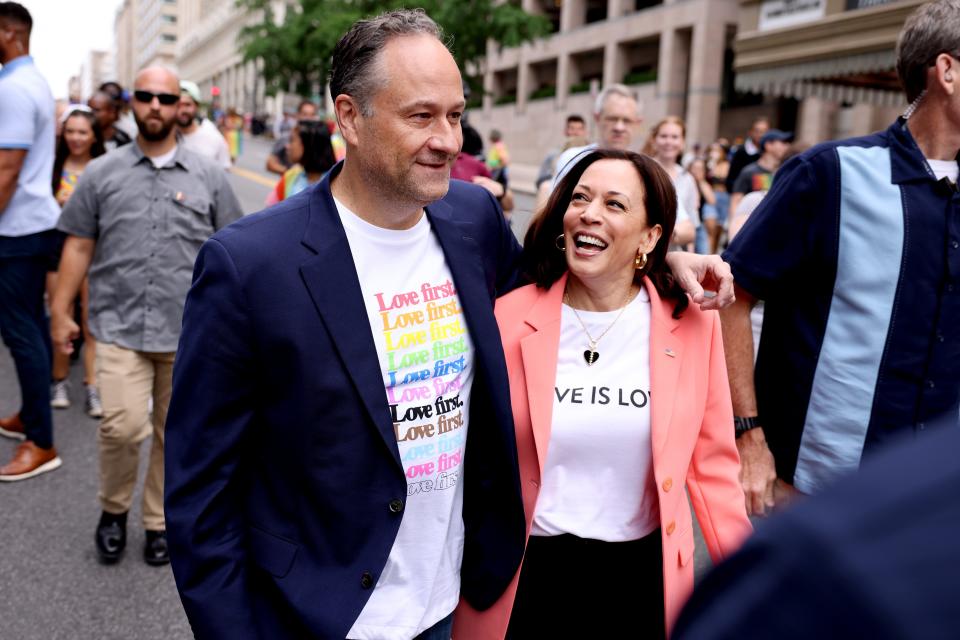
Related: Some Supreme Court justices skeptical of Texas abortion law, impact on other rights
Many advocates expressed frustration because Harris and the broader administration aren't perceived to be living up to their stated values with concrete action.
"For Build Back Better and the infrastructure package, you've seen meetings happening between key members of Congress and the president," said Morgan, who wants to see that same attention on voting rights legislation.
Nancy Cárdenas Pe?a, the Texas state coordinator for the National Latina Institute for Reproductive Justice, was part of a group of abortion rights advocates who met with Harris and other Democratic lawmakers in the nation's capital after Texas enacted one of the most restrictive abortion laws in the country.
“It’s not just enough to have photo ops and have press conferences talking about access when abortion care needs to be preserved in Texas," she said.
The Latina Institute works on immigration and abortion policy. Pe?a said Harris' office "has been open to having all of those conversations, but I think it's too soon to tell if anything concrete is going to come out of them."
Harris is "very forthright" and "super sincere in her concern," said Amy Hagstrom Miller, the founder of Whole Woman's Health, which operates four abortion clinics in Texas. The organization is the main plaintiff in a lawsuit against the state over S.B. 8, which is at the U.S. Supreme Court.
Miller noted most of the conversations with the administration were "pretty broad" and did not delve into concrete actions, though she did acknowledge the Justice Department's lawsuit against Texas over the law.
"There were conversations about codifying Roe and passing the Women's Health Protection Act. Other than that, I haven't heard from them," Miller said.
Thursday, the Biden administration announced another lawsuit against Texas, this one challenging a new state law that imposes restrictions on balloting by mail and aid provided at polling locations to voters with disabilities.
Politics over policy?
Central to many advocates' critiques is a sense that the administration is open to communication on major issues but won't take stronger public stances for fear of backlash.
"They are afraid of looking weak on enforcement and immigration," García said. "They aren't really pushing their own agenda but reacting to what these extremist, anti-immigrant, xenophobic groups, including some Republicans, are framing towards the border."
After the national outcry over images of Border Patrol agents chasing Haitian migrants on horseback, Harris spoke with Department of Homeland Security Secretary Alejandro Mayorkas to demand immediate remedies.
Making headway on contentious issues such as immigration is essential to her political fortunes, advocates said. Simply managing crises as they come is courting failure, they argued.
In a blow to Biden and his party, Republican Glenn Youngkin won a gubernatorial race in Virginia on Tuesday that could be a bellwether for next year's midterm elections. In New Jersey, Democratic Gov. Phil Murphy narrowly won reelection in a race he was expected to win handily.
The results increase pressure on Biden and Democratic leaders in Congress to pass the president's Build Back Better social spending plan and the bipartisan infrastructure bill.
Regardless of such challenges, advocates pine for action from the administration – and Harris.
"I don't think I can be in a place where I have sympathy for them right now because we are in such dire straits," Morgan said.
Follow Matthew Brown online @mrbrownsir.
This article originally appeared on USA TODAY: Kamala Harris faces criticism from immigration, voter rights activists
